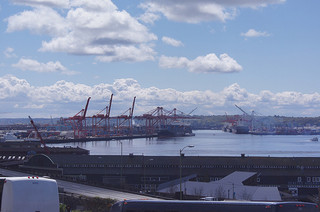 The ports of Seattle and Tacoma in the U.S. are seeking to reduce their traditional rivalry to counter the growing bargaining power of carriers as shipping lines increase their unit sizes and forge bigger alliances.
The ports of Seattle and Tacoma in the U.S. are seeking to reduce their traditional rivalry to counter the growing bargaining power of carriers as shipping lines increase their unit sizes and forge bigger alliances.
In a groundbreaking move which could be copied by other ports, authorities at the two ports have applied with the U.S. Federal Maritime Commission (FMC) for permission to share information and discuss matters such as rates of return, planning, utilization, operating costs, and charges.
But with each port having a number of terminals run by private operators, many of which are carrier-affiliated, consolidation of terminal ownership will likely be a prerequisite for success, according to a new report by Drewry Maritime Research.
As with other U.S. west coast ports, Seattle and Tacoma have to live with the legacy whereby each major carrier tended to have its own terminal. “This made sense when carriers were smaller and more independent, but with today’s mega carriers and alliances, the fragmentation of terminal capacity makes it harder to accommodate the growing needs of the likes of the P3, G6, and CKYH alliances,” said Drewry.
Each of the ports handles less than two million TEUs (20-foot-equivalent units) per annum, yet Seattle has four container terminals and Tacoma five.
Greater cooperation between the two port authorities, if approved by the FMC, will help to better manage the situation but, in the short term, it will not change the nature of their physical assets or allow individual terminal operators to cooperate, even if they wanted to, noted Drewry.
For Seattle and Tacoma, it makes sense to work more closely together, especially as the two ports ultimately share the same owner, Washington State. Significantly though, they have ruled out any talk of merger, and have also excluded the ability to take any collective action.
The steps being taken by Seattle and Tacoma also raise a wider question of whether other ports in the U.S. and elsewhere may also seek to work more closely together in the face of growing ship sizes and alliances.
In other developments, South Korea’s Fair Trade Commission (FTC) is also set to check if the proposed P3 alliance will be a violation of antitrust rules if approved, The Korea Economic Daily said in an online news report.
This comes as the commission reportedly received on February 4 a merger application from the three carrier-members making up the cooperation—Maersk Line, Mediterranean Shipping Co., and CMA CGM.
“As we are aware that the latest merger case has a critical impact on the whole shipping industry, we will make in-depth investigation on the matter in partnership with overseas competition authorities if necessary,” an FTC official was quoted as saying by the daily.
Photo: tedeytan




